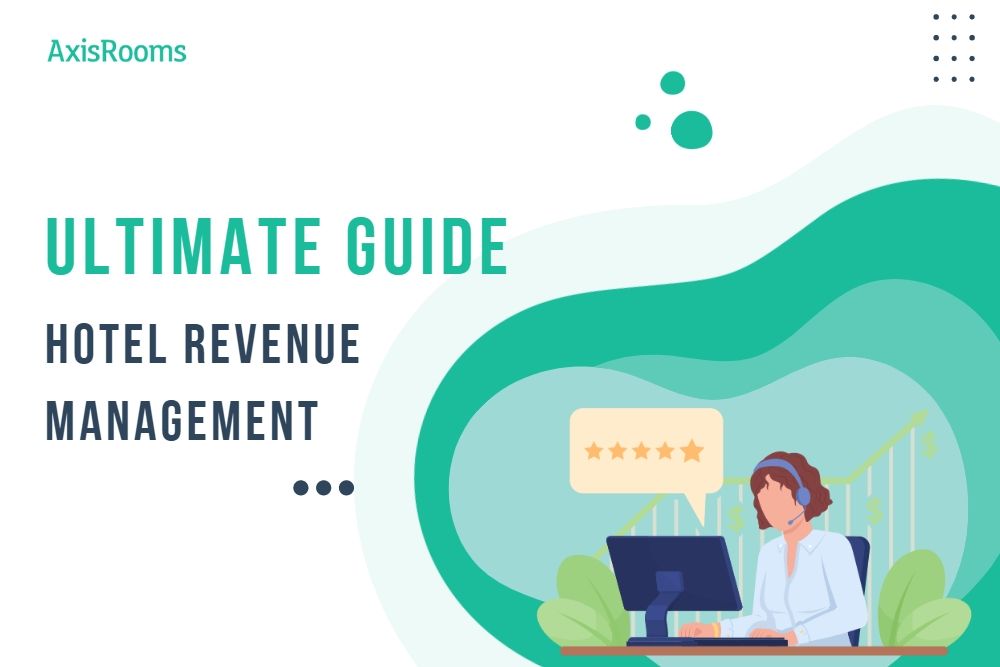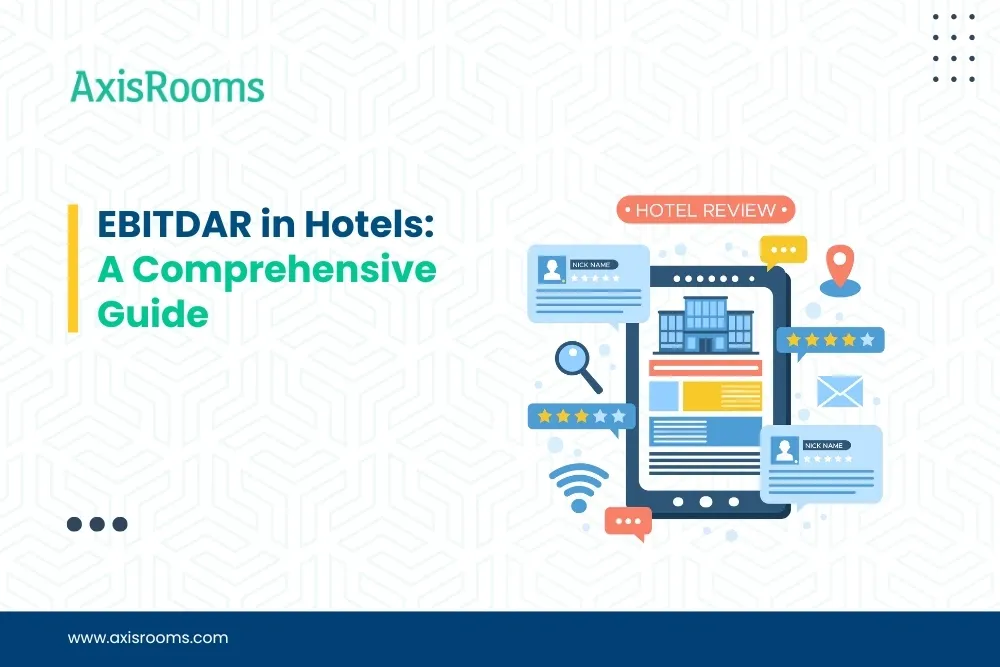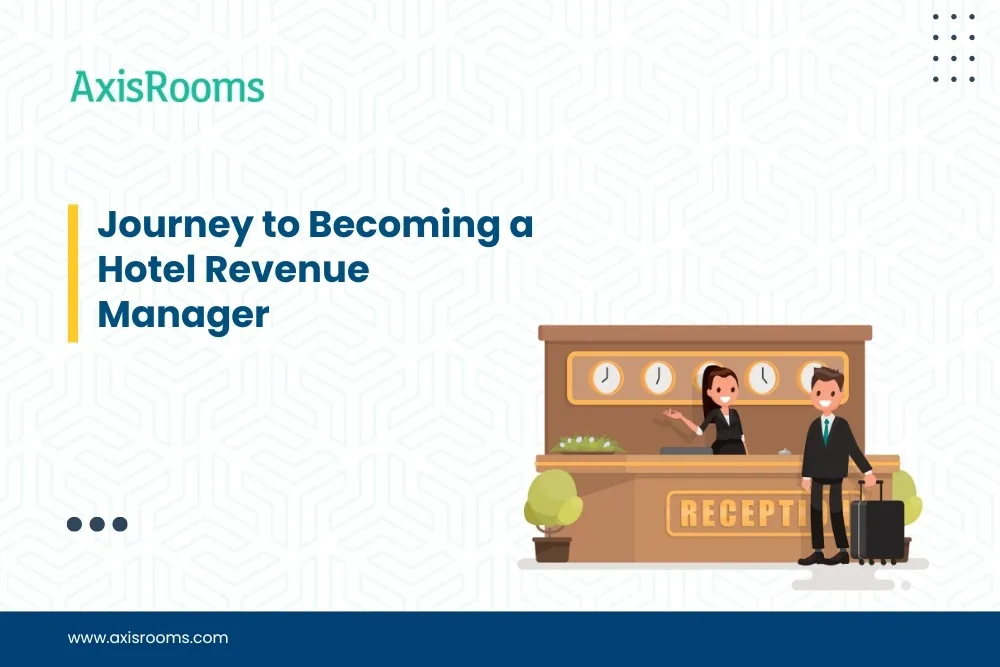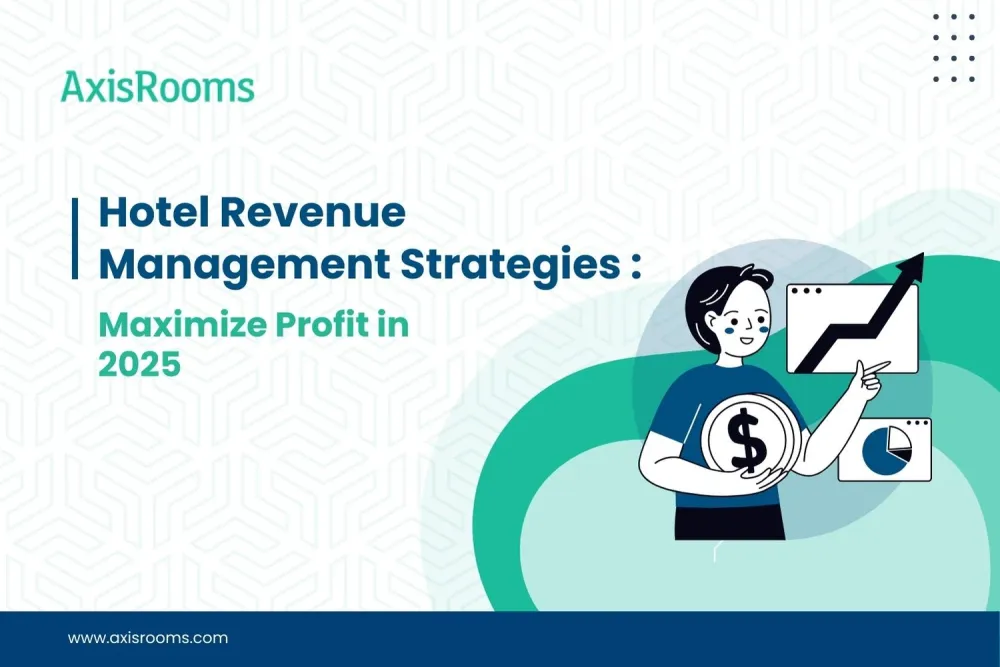Revenue management plays a vital role in the hospitality sector by enabling hotels to enhance their operations and boost profitability.
In this blog, we will delve into the fundamentals of revenue management, its importance within the hotel sector, the key factors that affect it, a range of strategies, and the tools that support its execution.
What is Hotel Revenue Management?
Revenue management in the hotel industry is a strategic approach that enables establishments to align the appropriate room with the ideal guest at the best possible time. This framework is built on in-depth data analysis, which aids in streamlining inventory control.
When hotels use targeted strategies they successfully attract and retain customers. The approach requires hoteliers to stay attentive of the market trends and changes and evolve based on the guest needs.
Strategic Revenue Management in the Hotel Industry
Strategic revenue management helps in analyzing historical data, understanding market trends, and identifying customer preferences. By developing a comprehensive strategy, hotels can anticipate shifts in demand and adjust their pricing models accordingly. This proactive approach not only enhances profitability but also fosters customer loyalty, as guests appreciate tailored experiences that meet their needs.
What is the Primary Purpose of Revenue Management?
The primary purpose of revenue management is to enhance profitability through intelligent pricing and inventory control. By understanding demand patterns, hotels can optimize their room rates and occupancy levels. This involves increasing prices during peak seasons and reducing them during low-demand periods. Ultimately, the goal is to maximize revenue per available room (RevPAR), a key performance metric in the hotel industry. By effectively managing revenue, hotels can achieve financial sustainability and thrive in a competitive landscape.
Why is Revenue Management Important for the Hotel Industry?
Revenue management is vital for several reasons:
Maximizes Profit:
Revenue management allows hotels to identify pricing strategies that work, helping them to maximize profits during busy periods.
Improves Occupancy Rates: Effective revenue management techniques can lead to higher occupancy rates, even during off-peak seasons.
Enhances Competitive Edge: By analyzing competitor pricing and market trends, hotels can stay ahead of the competition and attract more guests.
Adapts to Market Changes: Real-time data allows hotels to respond quickly to market fluctuations, ensuring they remain relevant and appealing to potential guests.
Factors that Impact Revenue Management in Hotels
Here are the factors that affect revenue management strategies in hotels:
Booking Channels: Different platforms, including direct websites and online travel agencies (OTAs), have varying customer behaviors and associated costs. Understanding these channels can help hotels optimize hotel distribution strategies.
Guest Segmentation: Recognizing the different types of guests—such as business travelers, families, and groups—enables hotels to tailor their offerings and marketing efforts effectively.
Competitor Pricing: Monitoring competitor rates is essential for setting competitive prices that attract guests without sacrificing profit margins.
Seasonality: Different times of the year bring varying demand levels. Hotels must be aware of seasonal trends and adjust pricing strategies accordingly.
Market Demand: It is important for hotels to understand demand fluctuations. When demand is high, it leads to higher prices and when demand is low, hotels have to reduce the pricing and offer discount packages to increase bookings.
How Does the Hotel Revenue Management Process Work?
Hotel revenue management process involves several steps. Firstly, hotels collect data from different sources such as past bookings, trends, feedbacks and competitor rates. This data is then analyzed to study demand patterns, and guest preferences.
Hotels utilize this data to forecast future demand, based on which they implement dynamic pricing models that adjust rates in real-time to align with the current demands. When these changes are established, they are applied across different distribution channels.
The metrics are then continuously monitored allowing hotels to make timely adjustments.
Revenue Management Strategies
Here are some common revenue management strategies employed by hotels:
Market Segmentation: Identifying specific customer groups and tailoring offers to meet their unique needs, enhancing the overall booking experience.
Utilizing Online Travel Agencies (OTAs): Partnering with OTAs to reach a broader audience and increase visibility.
Advanced Purchase Discounts: Incentivizing guests to book early with lower rates, ensuring a more stable revenue stream.
Group Sales Strategies: Offering special rates for large groups or events, which can significantly boost occupancy during off-peak times.
Loyalty Programs: Implementing rewards for repeat guests encourages customer loyalty and drives future bookings.
Promotions and Discounts: Creating seasonal or holiday promotions that attract guests during traditionally slower periods.
Package Deals: Bundling accommodations with additional services, such as meals or activities, to enhance value for guests.
Last-Minute Deals: Offering lower prices close to the check-in date to fill vacant rooms and reduce lost revenue.
Length of Stay Pricing: Encouraging longer stays by offering discounts or incentives for extended bookings, which can improve occupancy.
Dynamic Pricing: Adjusting room prices based on real-time demand, competitor rates, and other market factors.
Top 7 Tactics to Increase Hotel Revenue
To effectively boost hotel revenue, consider these ten tactics:
Cross-Sell Services: Offering additional services such as spa treatments, dining options, or local tours can enhance the guest experience and increase overall revenue.
Implement Mobile Booking Options: Ensuring a seamless mobile booking experience caters to the growing trend of mobile users.
Train Staff: Empowering staff with upselling techniques can enhance guest experience and increase revenue.
Monitor Competitor Rates: Staying informed about competitor pricing helps hotels adjust their strategies accordingly.
Improve Customer Experience: Providing exceptional service leads to positive reviews and encourages repeat bookings.
Leverage Social Media: Engaging with potential guests on platforms like Instagram and Facebook can create buzz and attract new customers.
Optimize Online Presence: A user-friendly and visually appealing website can significantly enhance direct bookings.
How Revenue Management Tools Work
Revenue management tools are designed to assist hotels in optimizing their pricing and inventory management. These tools utilize advanced algorithms and data analysis to:
Reporting and Analytics: Offer detailed reports and analytics to help hotel managers understand performance and make informed decisions.
Automate Pricing: Implement dynamic pricing strategies that adjust in real time according to market conditions.
Forecast Demand: Predict future occupancy rates and pricing trends based on historical data and market analysis.
Analyze Market Trends: Gather and analyze data from multiple sources, providing insights into demand fluctuations and guest behavior.
Benefits of Hotel Revenue Management Solutions
Here are the benefits of hotel revenue management solutions:
Stronger Market Position: Effective revenue management helps hotels maintain a competitive edge, ensuring sustained success in the market.
Enhanced Customer Satisfaction: Tailored pricing and personalized offers improve the overall guest experience.
Improved Efficiency: Automation reduces manual tasks and the potential for errors, allowing staff to focus on guest services.
Better Decision-Making: Data-driven insights help hotels to make informed strategic decisions.
Increased Revenue: By optimizing pricing strategies, hotels can increase their revenue potential by a great extent.
The Future of Hotel Revenue Management
While revenue managers and hoteliers are aware that it could be challenging to remain abreast of what is required to thrive today, what will the situation be in the coming five years?
Well, hotel business owners and revenue managers must begin to focus on where the hospitality industry is heading if they haven't already yet.
Owing to the Indian hospitality sector competitiveness, Indian hotels must strive harder to ensure they have the right team of industry professionals, work processes, and hotel revenue management strategies in place.
This will help them to increase revenue, capture market share, and eventually return value to shareholders.
Additionally, hotel revenue managers globally are needed to learn additional skills to stay competitive, given the constantly evolving expectations of today's travelers.
This change has been significantly driven by advancements in technology.
Revenue managers, in particular, have been embracing technology to enhance their ability to manage pricing across various channels and hotel revenue.
They are also leveraging the benefits of employing technology by upgrading their capabilities to evaluate data about client preferences and incorporate it into upcoming marketing strategies.
Let’s answer some questions on how employing new technologies and innovations can help revolutionize the ways hotels manage their revenue.
1. What Is the Impact of Machine Learning on Hotel Revenue Management?
Typically, a hotel makes over five million decisions annually regarding pricing. Any revenue manager would find it impossible to make the correct decision every time.
Due to this, you must adopt an automated revenue management software solution that makes precise pricing decisions by employing cutting-edge revenue analytic tools.
Hilton Worldwide (an American multinational hospitality company) uses machine learning to streamline pricing strategies and analyze pricing patterns. Additionally, they customize the guest experience and optimize loyalty programs using machine learning.
Today's technologically advanced revenue management systems that incorporate predictive analytics for the future and are powered by machine learning enable hoteliers in discovering new trends and more profitable business prospects.
In addition to setting prices that accommodate market changes, a revenue management software solution driven by machine learning also predicts these fluctuations in advance.
2. Is it Time for Hoteliers to Adopt Artificial Intelligence (AI)?
The two pressing issues hoteliers face nowadays are increased labor expenses and the accompanying strain on operating profits. Additionally, the volume of data that hotel businesses produce and gather will continue to expand.
This is where automation and AI come into the picture. They will enable a hotel to become more successful by assisting front-line hotel professionals in performing their duties more effectively.
Customers desire personalized offerings more tailored to their requirements, which is why several of them are willing to share data in exchange for that.
Since 2017, Marriott International ( a world-famous lodging company) has been using "Optimize," an AI-driven revenue management solution. This software solution predicts demand and instantly adjusts room prices using machine learning techniques.
AI offers an extensive range of possibilities to improve and reduce the workload of business operations that are now burdensome. It does it via system upgrades that are automated but remains personalized.
It enables your employees to dedicate more time to engaging with visitors and creating extraordinary and unique experiences, resulting in higher rates of guest satisfaction and customer engagement.
Hoteliers wanting to adopt AI-based solutions in their properties should assess their current operations and systems first to identify repetitive tasks with many potential outcomes.
3. How Is Blockchain Shaping the Hotel Sector?
Although blockchain is a modern technology, no one can accurately forecast how it will affect the hospitality industry. However, top hoteliers are embracing this technology. This means it may not be long until blockchain technology adoption becomes more prevalent.
TUI Group (a German leisure, travel, and tourism company) has moved all of its contracts to its blockchain platform. It is researching and exploring how blockchain technology could be employed for a variety of purposes, including revenue management.
TUI Group even collaborated with Winding Tree, a blockchain company, in 2019 to test a blockchain-based hotel booking system.
Unquestionably, the distribution channel could be optimized using blockchain technologies. Some examples of use cases include streamlining loyalty programs, rate, availability, inventory, and payments for reservations, descriptive content updates, and enabling direct reservations.
A matter of concern for all hoteliers employing blockchain should be what the OTA platforms are doing. According to some industry experts, blockchain could eventually make several OTA channels out of business.
Automate Your Revenue Management System with AxisRooms!
Revenue management is critical for hoteliers because it enables them to increase revenues by employing advanced technology and big data.
There is no doubt that the hotel sector is facing a challenging shift right now since travelers' needs are changing with time.
From that perspective, it is crucial to shift our focus to implementing cutting-edge technologies and robust solutions that employ AI and machine learning to increase yield, boost income streams, and improve the guest experience.
As a result, for the hospitality industry to redefine itself and continue to thrive, it must embrace new revenue management strategies and solutions, such as robust and reliable revenue management software.
You, being a part of the industry, can implement the strategies discussed in this blog to generate more income and increase profitability. Additionally, you must consider adopting a hotel revenue management software to streamline your work processes.
When you charge too much for your hotel rooms, you lose business. When you set your room rates too low, you, again, incur losses.
So, when it comes to increasing your profitability, a smart revenue management software can assist you in determining the ideal rate for each room at any given moment.
But hoteliers often fail to leverage all the benefits a revenue management system offers. So how do you ensure that it doesn’t happen to you?
Get your hands on AxisRooms’ revenue management service today to optimize your hotel revenue management.
Revenue management is an essential component of the hotel industry, serving as a critical tool for maximizing profits and enhancing competitive advantage. By understanding the principles and strategies involved, hotels can effectively manage pricing, occupancy, and guest satisfaction.
AxisRooms revenue management helps hotels optimize their strategies by analyzing market demand and trends. With advanced algorithms, it enables hotels to maximize revenue and their occupancy rates with the help of data-driven insights and automated pricing strategies.





